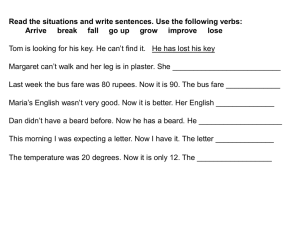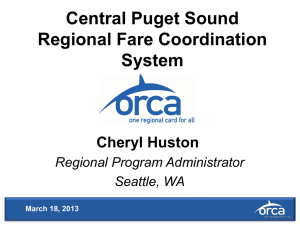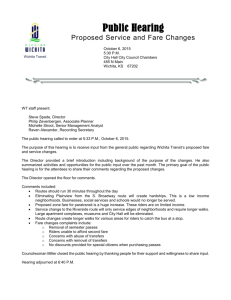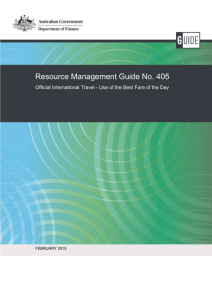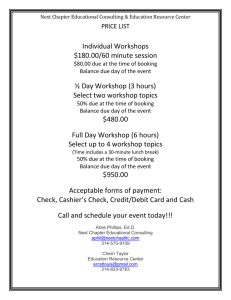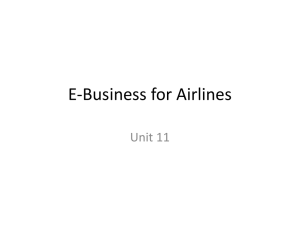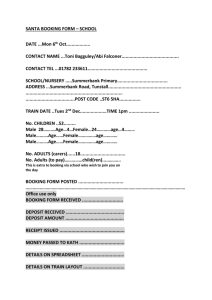Official International Travel - Approval and Use of the Best Fare of
advertisement
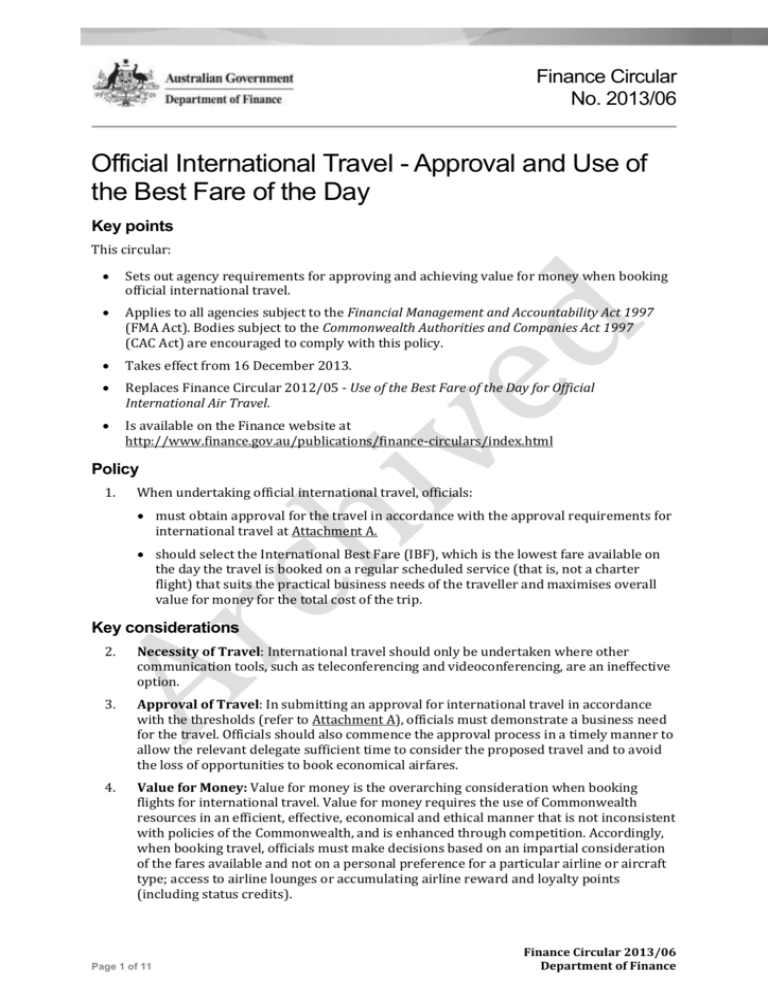
Finance Circular No. 2013/06 Official International Travel - Approval and Use of the Best Fare of the Day Key points This circular: Sets out agency requirements for approving and achieving value for money when booking official international travel. Applies to all agencies subject to the Financial Management and Accountability Act 1997 (FMA Act). Bodies subject to the Commonwealth Authorities and Companies Act 1997 (CAC Act) are encouraged to comply with this policy. Takes effect from 16 December 2013. Replaces Finance Circular 2012/05 - Use of the Best Fare of the Day for Official International Air Travel. Is available on the Finance website at http://www.finance.gov.au/publications/finance-circulars/index.html Policy 1. When undertaking official international travel, officials: must obtain approval for the travel in accordance with the approval requirements for international travel at Attachment A. should select the International Best Fare (IBF), which is the lowest fare available on the day the travel is booked on a regular scheduled service (that is, not a charter flight) that suits the practical business needs of the traveller and maximises overall value for money for the total cost of the trip. Key considerations 2. Necessity of Travel: International travel should only be undertaken where other communication tools, such as teleconferencing and videoconferencing, are an ineffective option. 3. Approval of Travel: In submitting an approval for international travel in accordance with the thresholds (refer to Attachment A), officials must demonstrate a business need for the travel. Officials should also commence the approval process in a timely manner to allow the relevant delegate sufficient time to consider the proposed travel and to avoid the loss of opportunities to book economical airfares. 4. Value for Money: Value for money is the overarching consideration when booking flights for international travel. Value for money requires the use of Commonwealth resources in an efficient, effective, economical and ethical manner that is not inconsistent with policies of the Commonwealth, and is enhanced through competition. Accordingly, when booking travel, officials must make decisions based on an impartial consideration of the fares available and not on a personal preference for a particular airline or aircraft type; access to airline lounges or accumulating airline reward and loyalty points (including status credits). Page 1 of 11 Finance Circular 2013/06 Department of Finance 5. Safety: Under no circumstances should this Finance Circular be read as requiring officials to use airlines with a poor industry reputation for safety. Information on aviation safety and security is available from the Department of Foreign Affairs and Trade (DFAT) at their website: www.smartraveller.gov.au. Applying the International Best Fare 6. To maximise value for money for the cost of international air travel, officials should consider: for outbound flights, the cost of flights that would depart within a 24 hour window before the latest possible departure flight (that is, the latest flight that will enable the traveller to meet their overseas commitments) for inbound flights, the cost of flights that leave within a 24 hour window after the earliest practical return flight any additional accommodation, meals, ground transport, incidental and baggage costs associated with the 24 hour window and include these in the calculation of the IBF. Officials may also take the employee cost of lost wages associated with lost work time into account where appropriate. 7. The 24 hour window is not intended to restrict or limit the use of fares outside this timeframe that may maximise value for money. 8. Where agencies allow for rest periods, these should be incorporated within the 24 hour window to the extent possible. 9. In booking flights for inbound and outbound international travel and travel within an international country, officials should select a business class or lower class airfare. 10. Travel within an international country or between international countries that is associated with a long-term posting, mission or deployment, is not considered international travel for the purposes of this policy. 11. Unless a limited number of airlines (i.e. one or two) service a particular route, officials should obtain three quotes from at least two different airlines for the same or equivalent fare class. 12. Where a domestic leg of travel is used for international travel, this domestic leg would be considered part of the overall international travel. However, the 24 hour window for calculating the IBF applies to the international legs and not the domestic leg of the trip. The domestic leg may also be subject to the agency's policy on fare class and fare type for domestic travel. Booking considerations 13. Airlines: Highly competitive airfares have been negotiated with a range of international airlines under the Whole of Australian Government (WoAG) Travel Arrangements (the Arrangements) that commenced on 1 July 2010. Officials are, however, not restricted to using the panel airlines in maximising value for money. 14. Airfares: Strategies that can be considered to maximise value for money in booking airfares include booking as far in advance as possible, being flexible with times, using less flexible tickets, and looking at different routes to the final destination. Officials should advise their Travel Management Company (TMC) of key business needs, for example direct routing or excess baggage requirements. 15. Accommodation: Officials should book, where possible, any accommodation associated with international travel through their TMC using the Diners Club payment facility, (the virtual account and/or the in-hand Diners card or Mastercard). The most cost effective accommodation should be selected i.e. a room rather than a suite. 16. TMC transaction fees: TMC transaction fees and WoAG administration fees are not included in the IBF calculation. Page 2 of 11 Finance Circular 2013/06 Department of Finance 17. Unused credits: Where travel is not taken and unused credits exist, officials should always select the IBF for any subsequent bookings and then apply any unused credits to reduce the fare price. 18. Lounge memberships: Airline lounge membership is not to be considered in applying the IBF. 19. Reward and loyalty points (including status credits): The implementation of the Arrangements on 1 July 2010 ceased the accrual of reward and loyalty points (such as frequent flyer points). However, status credits may still be accrued. Where officials have retained previously accrued reward and loyalty points, these should be used to reduce the cost of future flights required for official travel. It is Government policy that such points, where awarded for official travel, are not to be used for private purposes or to upgrade the class of official air travel. International travel considerations 20. Health and safety: Where considered necessary, officials should seek personal medical advice before undertaking international travel. Vaccinations may be necessary for some destinations. Officials should also familiarise themselves with any internal agency policies regarding health and safety while on official business. Further advice on health and safety, including country specific advice, is available from DFAT at their website: www.smartraveller.gov.au. Officials should also refer to the travel cover policy in the Comcover Statement of Cover available at www.finance.gov.au/comcover/. 21. Register the trip: Prior to leaving Australia, officials should register the details of their official international travel with DFAT at www.smartraveller.gov.au. International Best Fare Booking Codes 22. When booking official international air travel, officials must identify the reason a fare is selected using the IBF booking codes at Table 1 below. These include a code when the lowest fare is not selected. Table 1 – The International Best Fare Booking Codes No Booking Code 1 Lowest fare 2 Unsuitable due to time, routing, connection or baggage charges Map to IBF Guidance This is the cheapest available fare taking into account the 24 Hour booking window (refer to paragraph 6). Where the fare selected is not the lowest fare because: it is the most direct route; ensures connections for further flights are met; or takes into account excess baggage fees. 3 Approval / Entitlement to travel at higher fare class All air travel should be at the international best fare in the appropriate class (having regard to internal travel policy) unless there is a business case or entitlement to travel outside these guidelines. In these circumstances, officials are still required to obtain the international best fare within the entitlement. 4 Health issues 5 Personal responsibilities 6 Require flexibility to Where flexibility is required for air travel, travel bookers should consider selecting a semi-flexible fare type instead of a fully change booking flexible fare. Outside of IBF Preference for particular aircraft or airlines, availability of access to airline lounges, accumulation of airline benefits such as reward Policy or loyalty points (including status credits). 7 Page 3 of 11 Health issues for officers requiring certain facilities. A medical certificate should support use of this code. Impact on personal responsibilities such as family. Finance Circular 2013/06 Department of Finance Monitoring compliance 23. Agencies are responsible for managing compliance with this Official International Travel Policy in accordance with the agency's internal processes. 24. Each instance of non-compliance with the approval requirements for international travel must be documented and reported on the Certificate of Compliance. 25. To assist agencies in reporting against use of the IBF internally, the TMCs contracted under the Arrangements use a 24 hour window applied to the booked flight time to monitor whether the international best fare has been selected. This reporting is available to agencies through their TMC. 26. For outbound flights, the window commences 24 hours prior to the flight booked to enable the traveller to meet their overseas commitments. 27. For inbound flights, the window commences 24 hours after the flight booked to return to Australia. 28. The 24 hour window applies to the international legs and not the domestic legs of the trip. Accordingly, once the appropriate international flights have been booked on the basis of the IBF, then having regard to connectivity, the most appropriate domestic leg should be added to the trip. 29. Please see Attachment B for examples of using the IBF. Queries 30. For queries regarding this Finance Circular, please contact the Travel Contract Management Section at TCMS@finance.gov.au. John Sheridan First Assistant Secretary Technology and Procurement Division Business, Procurement and Asset Management 13 December 2013 Page 4 of 11 Finance Circular 2013/06 Department of Finance Attachment A Approval Requirements for Official International Travel: Official international travel must be approved in accordance with the following requirements. Where the total estimated cost (GST inclusive) of international travel, either individually or for a delegation or group activity, is: a) $20,000 or less, the travel must be approved by the relevant Secretary or Agency Head b) more than $20,000 and less than $50,000, the travel must be approved by the relevant Cabinet Minister c) $50,000 or more, the relevant Cabinet Minister must consult with the Prime Minister in writing before approving the travel. If officials from more than one agency are part of the same delegation or group activity, the lead agency should obtain approval in accordance with these requirements for the total estimated cost of the travel on behalf of all agencies involved. A diagram of these approval requirements is provided at page 7. Exemptions: i. The above approval requirements for international travel do not apply to the following list of essential operational activities to meet government policy objectives. Any future exemptions consistent with this policy will need to be agreed by the relevant Portfolio Secretary and immediately advised to the Department of Finance. Exemption: ii. Description: National security operations and investigations Protection of essential national security interests Personal protection Immigration and Border Protection actions Escort, repatriation and/or removal of illegal maritime arrivals and unlawful non-citizens Biosecurity activities Emergency and humanitarian responses Foreign emergency and disaster relief, and medical evacuations Defence, peace keeping and police deployments and operations Maintenance or restoration of international peace and security Postings, missions and deployments Movement of officials, family members or property Where an exemption applies, officials should continue to use relevant agency approval processes for international travel in accordance with the agency’s CEIs. Notes: i. The above approval requirements relate to the need for travel (purpose, number of officials and cost) and not the expenditure of public money. Agencies should continue to follow their Chief Executive Instructions to obtain approval to spend public money. Page 5 of 11 Finance Circular 2013/06 Department of Finance ii. The authority to approve international travel cannot be delegated by a Secretary or Agency Head. iii. Officials whose travel entitlements are covered by a Remuneration Tribunal determination and CAC Act bodies should comply with the spirit and intent of this policy. iv. Official travel is any travel where the Commonwealth is responsible for any direct or indirect costs associated with that travel. This includes travel by agency staff and where an agency pays for, or reimburses, the travel of other persons (such as contractors) to achieve one or more Commonwealth policy objectives. v. A delegation or group activity is where more than one official from an agency or agencies attends the same event e.g. conferences, conventions, summits, inspections, meetings or training courses. vi. The total estimated cost of international travel includes airfares, accommodation, meals, ground transport, and other travel related expenses such as baggage fees but excludes the cost of Ministers, Senators, or Members and their staff undertaking the travel. vii. When obtaining the approval of a Secretary/Agency Head or Cabinet Minister, the document used should be consistent with the agency's existing processes e.g. an Executive Minute or Ministerial Brief. viii. Where the proposed travel is $50,000 or more, the relevant Cabinet Minister must consult with the Prime Minister in writing on approval of the travel. The letter should set out the purpose of the proposed travel, intended outcomes, positions of the officials travelling, and include the suggested itinerary. A template for the letter is provided at page 8. Page 6 of 11 Finance Circular 2013/06 Department of Finance Page 7 of 11 Finance Circular 2013/06 Department of Finance THE HON [or] Senator the HON [insert name] MP [delete MP if Senator] Minister for [insert] The Hon. Tony Abbott MP Prime Minister Parliament House CANBERRA ACT 2600 Dear Prime Minister I am writing to consult you on a proposal for [insert number e.g. six] [insert agency] staff to travel to [insert destination e.g. Washington] as part of [insert purpose of travel e.g. ]. It is proposed that the delegation would depart Australia on [insert day and date] and return on [insert day and date]. The total estimated cost for this travel is over $50,000. The proposed visit is to [insert reason(s) why travel is necessary, including anticipated] outcomes]. The number of officials proposed for this trip has been kept to an efficient minimum. All travel will be at Business class or lower and the most cost effective accommodation has been sought. Details of the proposed travel are contained in the attached document [an example is provided over page]. Yours sincerely [insert name of Cabinet Minister] Telephone (02) [insert] Page 8 of 11 Parliament House, Canberra ACT 2600 Facsimile (02) [insert] Finance Circular 2013/06 Department of Finance Details of proposed international travel Date of travel 1 - 13 March 2014 Travel location(s) Washington Reason for Travel Name of travellers, position and contact number Mr John Citizen, Agency Secretary (02) 6215 0000 Ms Jane Doe, Deputy Secretary (02) 5215 0000 Ms Mary Citizen, Deputy Secretary (02) 6210 1234 Mr Paul Official, Deputy Secretary (02) 6201 5678 Ms Ann Official, Assistant Secretary (02) 6102 9876 Airfares (and class) $30,000 (5 x Business class return fares) Accommodation $/type/nights $250/room x 12 nights x 5 officials = $15,000 Meals/ incidentals $75 per day per person = $4,500 Ground transport $750 TOTAL COST $50,250 Page 9 of 11 Finance Circular 2013/06 Department of Finance Attachment B Choosing the International Best Fare: Below are three examples of how to choose the International Best Fare (IBF). It is mandatory that an IBF Booking Code (refer to paragraph 22) be provided at the time of booking official international air travel. Please note: Booking Codes 1 to 6 are for fares compliant with the IBF. Booking Code 7 is for fares outside the IBF. Example 1 - Lowest fare An official is travelling from City A in Australia to City B overseas. Three quotes have been obtained from the TMC with different airlines for the same or equivalent fare class and fare type and similar total travel time. Airline A is selected because the fare is the lowest fare. The official therefore uses Booking Code 1. Quote Airline City Pairing Total Travel Time Price Fare Selected Booking Code 1) Airline A City A – City B 20 hours $8,000 1 2) Airline B City A – City B 19 hours $9,500 3) Airline C City A – City B 21 hours $9,000 Example 2 - Timing An official is travelling from City C in Australia to City F overseas. Three quotes have been obtained from the TMC with different airlines for the same or equivalent fare class and fare type and similar total travel time. Airline B is selected because the fare is the most direct route to City F and the lowest fare that meets the practical business needs of the official. The official therefore uses Booking Code 2. Quote Airline City Pairing Total Travel Time Price 1) Airline A City C – City D - City F 30 hours $9,500 2) Airline B City C – City F 25 hours $10,000 3) Airline C City C – City E – City F 29 hours $11,000 Fare Selected Booking Code 2 Note: In this example, potential missed savings of $500 would be reported by the TMC to reflect the difference between the lowest fare available and the fare selected. Page 10 of 11 Finance Circular 2013/06 Department of Finance Example 3 – Fare Outside the IBF An official is travelling from City K in Australia to City L overseas. Three quotes have been obtained from the TMC with different airlines for the same or equivalent fare class and fare type and similar total travel time. Airline C is selected because the official has a preference for Airline C regardless of whether the fare meets the official's practical business needs. The fare selected is not compliant with the IBF. The official therefore uses Booking Code 7. Quote Airline City Pairing Total Travel Time Price 1) Airline A City K – City L 25 hours $9,500 2) Airline B City K –City L 24 hours $10,500 3) Airline C City K – City L 27 hours $11,000 Fare Selected Booking Code 7 Note: In this example, potential missed savings of $1,500 would be reported by the TMC to reflect the difference between the lowest fare available and the fare selected. Page 11 of 11 Finance Circular 2013/06 Department of Finance
